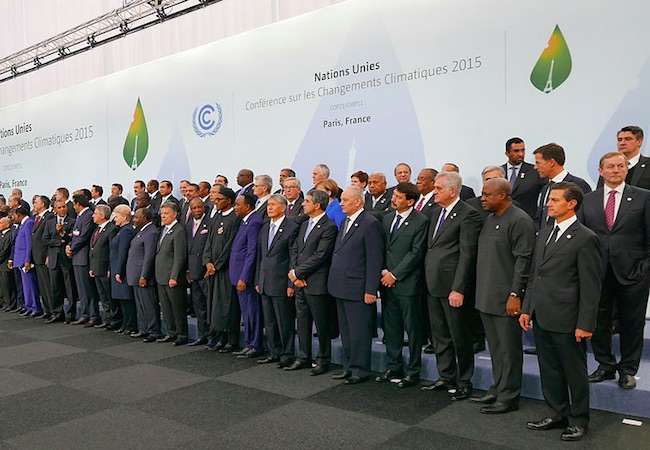
By S. Sadia Kazmi
Whether the Paris’ Climate Conference delivers or not, the more pressing and immediate task for Pakistan is to set its priorities right. Survivability and security of a country and its people against all sorts of existential threats, usually features at the top in the security calculus of any state. However looking at these threats only through the lens of “traditional dangers” such as war and invasion, limits the state’s tendency to devise a comprehensive security mechanism. The ongoing Conference of the Parties (COP21) in Paris is the one last effort to direct world’s attention to a much graver, imminent yet a non-traditional threat that is looming in the face of whole mankind. It is being termed as the “last chance for humanity” if the responsibility is not equally shared and an honest effort along with timely and effective measures are not taken.
Despite having been hit hard by the adverse affects of climate change, Pakistan is yet to fully wake up to the stark reality that the human life in this country is at a much greater risk because of unexpected spells of heat waves, recurrent floods, droughts and scarcity of rains on everyday basis than it is at the hands of possible threat of war, invasion or bombing. It is evident from the most disastrous floods of 2010 which alone displaced twenty million people which is a single massive climate induced disaster. However the common awareness among people and government’s response towards this issue is still largely ineffective. This claim is easily validated if one looks at the general disposition of present and past governments and their efforts towards the mitigation of this ever growing threat. It has been almost close to naught! Yes there is a National Climate Change Policy which itself took several years to take shape and finally came about in 2012; only to be shelved into the darkest forgotten crevice of government building, partially owing to the regime change. Not only did the present government shamelessly fail to meet the UN deadline for the submission of INDC document on 1st October, the document itself had to face a lot of criticism and is regarded as the most poorly drafted document with several loopholes mainly because it fails to clearly state Pakistan’s financial and technological limitations and its ever growing vulnerabilities caused by climate change. Similarly the Appointment of Climate minister Mr. Zahid Hamid only a couple of weeks before the Climate Summit reflects upon the hurried and poor planning that went into the preparation of the conference. Furthermore a very brief speech by PM Nawaz Sahirf at COP21 did not help much or made the case any stronger.
There is a need to realize that it is not just about making a speech at some high profile global event but is a continuous process which demands honesty, resolve and dedication. At the home front, the government needs to address this issue with sincerity, dedication and utmost seriousness. Only making National policies and not implementing them will not serve the purpose. Also instead of making manifestos centered on vote oriented projects such as motorway and metro and sanctioning coal based power plants, the government should be more eager to switch to alternative energy resources such as solar, wind, hydal and nuclear options. One doesn’t need to be an expert to tell how air pollution from burning of fossil fuel used in automobiles and factory furnaces and kilns is causing huge health risks to one and all.
The government should add incentives to the budgetary planning where rebates on custom duty for hybrid cars can be introduced. Efforts should be made to cut down on carbon gas emission and strict punitive measures should be taken against factory owners who dump their toxic wastes into open air or water bodies. Similarly deforestation should be discouraged, which is the largest cause of floods along with rise in atmospheric temperature, and more finances should be reserved for plantation and forestry. Otherwise one should not complain about rising temperatures and frequent heat waves hitting Karachi and other parts of the country. The recent scientific findings claim that Pakistan’s glaciers in the North are at the higher risk of melting at much greater speed than elsewhere because of global warming. Hence there is a need to take solid and timely measures to prevent floods. Taking the population into confidence, securitizing them towards this threat and building up of dams and reservoirs can provide a climate resilient infrastructure that can help in averting future threat of floods.
Last but not the least, the common people should develop and inculcate sense of civic responsibility among themselves where simple every day habits such as switching off electric appliances when they are not in use, staying watchful of water and gas pipe leakages in streets and homes, regular checkups and maintenance of their automobiles not just for personal safety but also to minimize the emission of pollutants in the air can help to a great deal.
By not taking any concrete steps, the government is only aiding and abetting the threat of Climate change. A country like Pakistan which is most vulnerable to climate change cannot afford to be complacent about it anymore otherwise the stated goal of National Climate Change Policy “to ensure that climate change is mainstreamed in the economically and socially vulnerable sectors of the economy and to steer Pakistan towards climate resilient development”, will only remain a farfetched idea.




